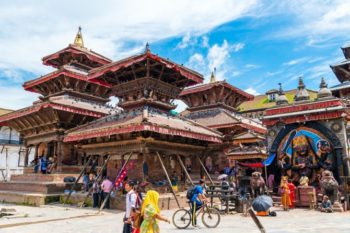Culture Cross-Cultural Communication For Expat in Nepal
Nepal is officially a secular country. But it in fact its unique blend of Hinduism and Buddhism is prevalent throughout daily life in the Kathmandu Valley. The Newari people, the majority in the Kathmandu Valley are an example of this merging of Hinduism and Buddhism and art work depicting this can be found in the many temples, traditional buildings and houses, particularly in Kathmandu and Patan Durbar Square and the Durbar Square and surroundings of Bhaktapur. Many other Newari towns and villages can be found within the Valley such as Sakhu, Thimi, and Bungamati.
When entering Hindu temples and Buddhist monasteries it is expected you remove your shoes and walk clockwise around the temples, shrines, and stupas. There are some Hindu temples where non-Hindus are not allowed and usually they will be signposted. There are no such restrictions in monasteries and around Buddhist stupas.
It is courteous to dress with respect when entering religious areas. In fact it is best to be respectively dressed at all times – this is still a very conservative country. Whereas no one will point out if your shorts are too short or your top is too revealing, you will be thought the less for it. Use your common sense.
As foreigners, we do get away with a lot of cultural errors – such as entering the kitchen in Brahmin homes – but it is good to try and read up about these things and avoid making mistakes if possible. In Nepali culture a guest is a god, but that doesn’t mean we should be uncaring in our behaviour.
No doubt you will be working in a multi-cultural office, with people from different countries as well as Nepalis. In the UN and larger INGOs local staff are pretty familiar with the ways of expats and are obliging and hard working. Perhaps not so much in smaller office, NGOs or private organisations. Be patient when things seem to be taking too long; try not to lose your temper when things go wrong, and respect the fact that in the field Nepalis will have a better understanding of how to approach community members etc. But don’t let your professionalism be undermined.
If you have household staff you may have ‘inherited’ them from your predecessor or they may have worked for expats in the past. On the whole these staff members will be familiar with the odd behaviour of expat families! If your staff have not worked for expats before, your work may be cut out for you in training them in hygiene and cleanliness, particularly important if you have young children.
We receive great feedback from families who have nannies – all Nepalis love children! Ask you colleagues and friends for the current staff salary rates, bearing in mind that INGO staff tend to pay their staff very highly when compared to long term expats or locals. As a rough guide, a 9 to 5 housekeeper who works 5 days a week might receive a salary of Rs15-20,000 a month from an expat family but will only expect to receive around Rs3,000 from a local family.
Don’t pay over the going rate but do expect to pay more for your staff than a local family does. Guards/ gatemen can be hired individually or through a registered company. You will pay more through a company but then you don’t need to worry about what to do when it’s the guards day off, or if he is sick or when its his vacation time.
All staff, office, household, gardeners etc., will expect (and it’s the country norm) another month’s salary during the main festival time of Dashain/ Tihar. They will also expect around 15 days off during this time. However, it is not normal for Nepalis to take vacations at other times of the year.
What is expected is a long period of time off (up to 15 days) when a close relative dies.
If you are single you might be thinking of romance! Nepali people in general are very easy to fall in love with! For expat women, finding a guy is not a big problem (although finding a ‘genuine’ one might be more of a challenge). For expat men it is much harder as even working women cannot come out in the evenings (family rules and obligations). Everyone should be aware that expats are often seen as a bit of a ‘meal ticket’ or visa out of the country. Not that this should stop you making friends, just be a bit aware. Additionally, when a Nepali professes love, it might not have the same meaning as in the West. In a country where arranged marriages are still the norm, expectations from a relationship are different and what seems all very romantic today may be a tough road of Nepali family obligations in the future.
Learning the language will go a long way towards better cross-cultural communication. But not all of us are naturals at language. But the basics will definitely help in day-to-day life.


